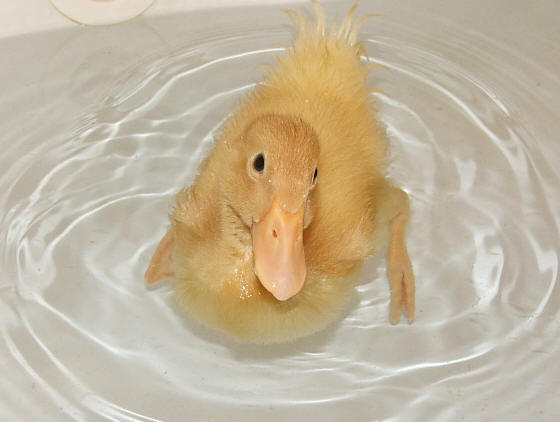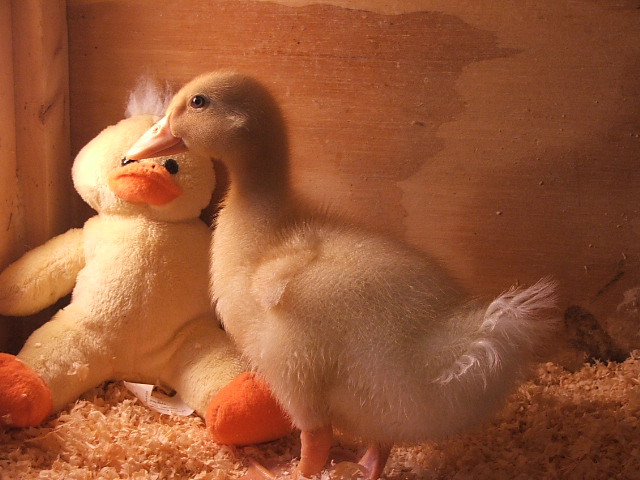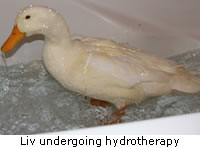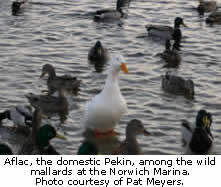|
In This Issue...
 |
Easter Campaign |
 |
Liv's Rehabilitation |
 |
A
Ducky to Kentucky |
 |
Aflac rescued from Marina |
 |
Stop
Easter Cruelties |
 |
Reader Poll #2
|
|
|
|
Stop Easter Cruelties |
|
Rabbits,
Chicks and Ducklings are a lifelong commitment. Sadly, most
of these animals face futures not as happy pets, but as
unwanted or neglected animals. Every year at Easter time,
those cute, fluffy, furry animals associated with
spring—chicks, ducklings and rabbits—experience the
onslaught of consumer demand and are bought as toys for
children or used as "props" in portrait studios.
They may be
dumped in the woods with the thought that they can "revert
to being wild," which they cannot, or given up and often
euthanized at an animal shelter.
These domesticated species
cannot fend for themselves and will die if released into the
wild. Why do these once-loved animals end up this way? It's
hard work taking care of any animal, and these animals need
special care. They can carry salmonella and infect the
humans who handle them. And to most people, when baby
animals grow up they're no longer cute.
This Easter,
instead of giving a live animal, consider giving a stuffed
animal—they're cuddly, cute, and easy to care for. Children
lose interest quickly, and "Easter animals" may live ten
years or longer. When children are no longer interested in
their new animal "toy" it is the animal who pays.

There is a
right time to bring a pet into the family. When your family
is ready to make a lifelong commitment to a pet, go to the
local animal shelter, where the staff can help you find an
animal who is suited to your household.
Remember, an
animal is a lifetime commitment, not a holiday toy to be
bought as a gift and momentarily enjoyed. When you are
tempted to make a present of a living Easter bunny,
duckling, or chick, remember these facts:
 |
Baby animals grow
up quickly to be adults who may not be so appealing to a child. |
 |
All animals
require a serious commitment of time and energy—they need daily
interaction and playtime with people, food, water, exercise,
attention, and regular veterinary care. |
 |
Chickens, ducks,
and rabbits need special care. |
 |
Chickens,
ducks, and rabbits are among the species that can transmit
salmonella. |
 |
Baby animals can
be accidentally killed or permanently injured if children (or
adults) handle them incorrectly. |
Article
Copyright © 2001 The Humane Society of the United States.
www.hsus.org.
|
|
Reader
Poll #2 |
Question: Should
ducklings be hatched out in schools for educational
purposes?
Results of Reader
Poll #1 Do you
think Sonoma Foie Gras (California's lone foie gras
producer) will find a way to continue to produce and sell
foie gras after 2012?
|
|
Contact
Us |
Majestic Waterfowl
Sanctuary
17 Barker Road
Lebanon, CT 06249
directorATmajesticwaterfowl.org
|
|
Our Newsletter |
|
The Majestic Monthly is published 12 times per year. Back
issues can be obtained online from our
Newsletter Archives. |
|
Ducklings,
Goslings, and Bunnies . . . Oh my!
With
Easter coming up fast, we needed a resource of information to help
us with our campaign against the frivolous purchasing of ducklings
and goslings. We turned to our neighbors at the House Rabbit
Connection in Massachusetts for some assistance with our Easter
campaign.
The HRC (www.tagyerit.com/hopline)
faces a similar dilemma as the Easter holiday approaches. We both
see domesticated animals abandoned in the weeks after the holiday
novelty wears off.
The HRC graciously shared useful
information and contacts to increase our outreach prior to the
filling of Easter baskets this year. We will be releasing
information to the newspapers, radios and have been invited to share
space with the HRC at an informational booth at Petco on February
19th (11:00 a.m.–2:00 p.m.) in Manchester, CT. increase our outreach prior to the
filling of Easter baskets this year. We will be releasing
information to the newspapers, radios and have been invited to share
space with the HRC at an informational booth at Petco on February
19th (11:00 a.m.–2:00 p.m.) in Manchester, CT.
We look forward to future Easter
endeavors with our MA friends at the HRC and thank them for their
assistance in getting us moving in the right direction.
Tub Therapy for Liv
We
rescued Liv off of Spaulding Pond in Norwich, Connecticut last
November. Liv came to us with a disturbing limp. We separated her
from the other ducks to ensure that she would have ample time to
heal without any interference from the others.
She went for a complimentary visit
at
All Friends Animal Hospital,
but no swelling, breaks, or areas of discomfort were found during
her examination. After many more weeks of R&R, it became apparent
that Liv was going to need an x-ray to see if perhaps she was
suffering from a dislocated hip joint.
Liv is one of ten rescues from
Spaulding Pond. Of these ten rescues, five suffer from permanent
limps that are the result of serious injuries, including broken
bones. The reason we have so many leg injuries from this one
location is that one shore of Spaulding Pond is comprised of large,
jagged rocks that are very dangerous. The ducks that are abandoned
on this pond suffer serious injuries from slipping and falling while
traversing this area.

Liv went for her free x ray in
January and we were relieved to receive confirmation that she has no
broken or dislocated bones. Having determined there is no risk of
further injury and that her limp is most probably caused by a severe
sprain or torn ligament, we began her therapy.
Three days a week, Liv is brought
inside to a nice warm tub where she is encouraged to swim to work
her leg muscles. She has responded very well to her therapy and is
making marked improvements. She is also becoming more accustomed to
human interaction and allowing us to pet her without protest.
Liv has a wonderful home lined up
for her once she is on her feet again.
A Ducky to Kentucky
 Pekins
may not fly, but that’s just what our Fiona did! She flew south in
January to her new home in Kentucky. Fiona was
rescued from Spaulding Pond in Norwich, Connecticut and is now
residing with a Pekin hen and local celebrity, Qwaka. Pekins
may not fly, but that’s just what our Fiona did! She flew south in
January to her new home in Kentucky. Fiona was
rescued from Spaulding Pond in Norwich, Connecticut and is now
residing with a Pekin hen and local celebrity, Qwaka.
Qwaka was a duckling rescue from a
Kentucky golf course who had never seen another duck until meeting
Fiona. Calls and emails from her new family have confirmed that the
two became fast friends and are enjoying each other's company. The
two ducks spend their days foraging together in a fenced in backyard
with a small pond. Their daily meals include lettuce, tomatoes,
eggs, and Mazuri food, among other healthy snacks.
Aflac Rescued from Marina
An
email came in two days before the January 22nd blizzard. A Pekin
drake, dubbed Aflac, surviving at the Norwich, Connecticut marina,
was in need of assistance. Pat Meyers, a local resident who had been
feeding Aflac for some time, contacted us to help rescue Aflac
before the blizzard hit.
With little time to act, we were
not able to rescue Aflac before the storm, but fortunately Pat
visited him during the blizzard to be sure he had food. She went out
to him the morning after, and we were all relieved to find that he had braved
the storm.
morning after, and we were all relieved to find that he had braved
the storm.
Pat was able to safely capture
Aflac and went so far as to deliver him to his new home in Lebanon
CT. Thank you, Pat, for your perseverance and determination!
|